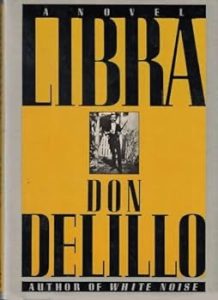Viking
Essay by Brian Tanguay

Returning to a book I read twenty or more years ago is usually revealing, both about the book and myself. The book is the same, but as a reader I hope I have changed. How will the book strike me now? Will I remember its central themes and characters? Will it move, disturb, delight, amuse, or unsettle me more now than it did upon first reading.
After listening to a Library of America podcast arguing that novelist, playwright, screenwriter and essayist Don DeLillo deserves to be awarded a Nobel prize for his body of work, I went to my shelves and pulled Libra from a half dozen DeLillo novels. In my early 30s I read DeLillo in the same immersive way I read Henry Miller, John Steinbeck and Philip Roth — one volume after another. DeLillo puzzled me because his novels present familiar elements that often seem alien. What Delillo does, I realized this time around, is slip the reader into the world inside the world. The world of Libra is that of anti-Castro Cuban exiles, current and former members of the CIA, mob figures who want their piece of Cuba back, John F. Kennedy, and Lee Harvey Oswald, a misguided idealist. This world exists inside the paranoid imaginings of the John Birch Society, the Cold War, and the New Frontier. Undercurrents of America: even in the age of Camelot, the country is deeply divided.
Libra showcases DeLillo’s unique prose style, the precise and often short sentences that create a palpable rhythm and pace. The dialogue is clipped, staccato, and propulsive. When DeLillo makes observations about America I have to remind myself that he wrote this novel in 1988, years before digital technology took over our lives. “Devices make us pliant,” DeLillo wrote. “We want to please them.” Prescient or what? He noted something else that has come to pass in the 21st century: the role of money in organizing and shaping society, politics, government, and our economy. “Moving and hiding money. Building reserves of money. Financing vast operations with complex networks of money.” The adage, “follow the money,” is timeless.
The plotters in Libra don’t set out to kill JFK. What they desire from their elaborate, multi-layered conspiracy is a spectacular miss that can credibly be blamed on Cuba and Castro, employed as a pretext to gin up support for what we now call regime change. Prescient again. Taking Castro down will also avenge JFK’s perceived betrayal of the Bay of Pigs operation.
Cuba never fails to stir America’s worst obsessions.
In DeLillo’s imagining, Oswald is a tragic character who grew up poor and ostracized, a pathetic outcast. Using what is known about Oswald — his service in the Marines, defection to Russia, marriage to a Russian woman — DeLillo infuses the facts with interior details to give Oswald dimension and complexity. We encounter his mother, a put-upon woman, and the wife he often abused. Oswald’s mother says, “Lee Harvey Oswald is more than meets the eye.”
Nicholas Branch is a quintessential DeLillo character. His role is minor, but important to the theme of the book. Hired by the CIA to compile a complete history of the Kennedy assassination, Branch toils in a room built especially for this purpose; it’s crammed full of documents, reports, files, photographs, audio recordings, and each day brings more information, data, analysis; it arrives in overwhelming drifts and blizzards, a volume impossible to synthesize. Branch has studied the case so long that he feels himself merge with Oswald. “All he knows for sure is that there is a missing element here, a word that they have cancelled completely.” Is that word Truth? Can we ever know the truth, particularly as it relates to government agencies that specialize in secrecy? No wonder DeLillo says the truth of the world is exhausting.
Libra is a good entry point for new readers of DeLillo. One can then move to White Noise or Mao II before taking on the monumental Underworld. DeLillo’s 21st century works, like Cosmopolis and Falling Man, tend to be shorter. But no matter the order in which one reads DeLillo, his work leads you to the world within the world. Be prepared: the journey may be unsettling, but isn’t that one of the purposes of great art?
